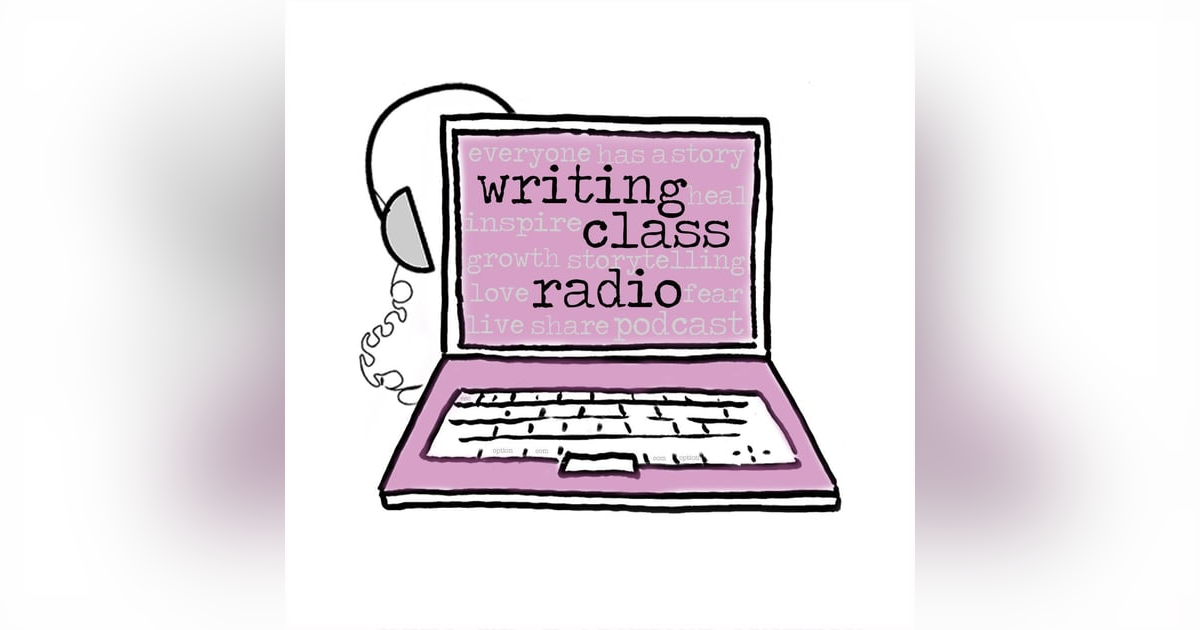
Sign up to get updates from us
By signing up, you agree to receive email from this podcast.

Have you ever told a story or shared a secret and regretted it? Like you wake up the next morning and you’re like ew, why’d I say that? And then you want to vomit? Today we’re talking about telling stories that give us emotional hangovers. Those times when you feel you told too much. In this episode, Nicki Post tells her story about the time she was raped. Andrea discusses the class rules after someone tells a story. We pretend the person who just told the story isn’t in the room. We address that person as the narrator and talk about what worked and what didn’t work in his or her story. We do this because it creates a separation between the person’s life and the person’s story. The comments can only be about the writing. We can talk about where we got confused in the story. Or where we wanted more details. Or where we wanted less details. Those are the types of comments that are fair game in class. “So even if someone says they were raped, we can’t say, ‘Oh my God, are you okay?’” Another thing that happens in class is the narrator wants to clear up anything people don’t understand, but the narrator has to stay silent. When this happens, Andrea always says, “We don’t care about your life, we care about your story.” That’s true in class, but outside of class, we care about each other’s lives. The day after telling her story in class, the first time Nicki told a group of people (a group of strangers), she speaks to Andrea and Allison about the emotional hangover she experienced after telling her story. She felt pretty bad telling her story. But here’s the thing, she submitted the same story to a live storytelling show in Miami. If you live in Miami, you can see Nicki tell her story this Saturday, May 7th. Nicki told Andrea she’s expecting to have another hangover, but she’s telling her story again anyway. We know that whenever we tell a hard story, whether or not it causes a hangover, it always us brings us closer to the people we’ve told. And when that hangover clears, whatever it was that was so hard to tell, doesn’t feel so hard anymore. We always feel better after telling our story. You’ll hear Italome Ohokihare tell her story from our community class called, A Time I F’d Up. The story is about a time she shoplifted.
Writing Class Radio is a podcast where you’ll hear true personal stories and learn a little about how to write your own stories. Writing Class Radio is equal parts heart and art. By heart we mean the truth in a story. By art we mean the craft of writing. No matter what’s going on in our lives, writing class is where we tell the truth. It’s where we work out our shit, and figure out who we are.
There’s no place in the world like writing class and we want to bring you in.
Writing Class Radio is co-hosted by Allison Langer (www.allisonlanger.com) and Andrea Askowitz (www.andreaaskowitz.com). Writing Class Radio is produced by Misha Mehrel, Andrea Askowitz and Allison Langer. This episode was produced with additional support from Tobi Ash.
Visit our musicians page to learn about the talented and generous people who allowed us to use their songs.
There’s more writing class on our website(www.writingclassradio.com), Facebook (https://www.facebook.com/writingclassradio/) and Twitter (@wrtgclassradio).
If you love the lessons you get on each episode, you can get them ALL in one place--our three-part video series. $20 for one part or $50 for the series. Click on Video Classes on our website.
Writing Class Radio is now open to submissions from our listeners. Go to the submissions page on our website for guidelines. We pay!
If you want to be a part of the movement that helps people better understand each other through storytelling, please go to writingclassradio.com and hit the DONATE button.
There’s no better way to understand ourselves and each other, than by writing and sharing our stories. Everyone has a story. What’s yours?
Have you ever told a story or shared a secret and regretted it? Like you wake up the next morning and you’re like ew, why’d I say that? And then you want to vomit? Today we’re talking about telling stories that give us emotional hangovers. Those times when you feel you told too much. In this episode, Nicki Post tells her story about the time she was raped. Andrea discusses the class rules after someone tells a story. We pretend the person who just told the story isn’t in the room. We address that person as the narrator and talk about what worked and what didn’t work in his or her story. We do this because it creates a separation between the person’s life and the person’s story. The comments can only be about the writing. We can talk about where we got confused in the story. Or where we wanted more details. Or where we wanted less details. Those are the types of comments that are fair game in class. “So even if someone says they were raped, we can’t say, ‘Oh my God, are you okay?’” Another thing that happens in class is the narrator wants to clear up anything people don’t understand, but the narrator has to stay silent. When this happens, Andrea always says, “We don’t care about your life, we care about your story.” That’s true in class, but outside of class, we care about each other’s lives. The day after telling her story in class, the first time Nicki told a group of people (a group of strangers), she speaks to Andrea and Allison about the emotional hangover she experienced after telling her story. She felt pretty bad telling her story. But here’s the thing, she submitted the same story to a live storytelling show in Miami. If you live in Miami, you can see Nicki tell her story this Saturday, May 7th. Nicki told Andrea she’s expecting to have another hangover, but she’s telling her story again anyway. We know that whenever we tell a hard story, whether or not it causes a hangover, it always us brings us closer to the people we’ve told. And when that hangover clears, whatever it was that was so hard to tell, doesn’t feel so hard anymore. We always feel better after telling our story. You’ll hear Italome Ohokihare tell her story from our community class called, A Time I F’d Up. The story is about a time she shoplifted.
Writing Class Radio is a podcast where you’ll hear true personal stories and learn a little about how to write your own stories. Writing Class Radio is equal parts heart and art. By heart we mean the truth in a story. By art we mean the craft of writing. No matter what’s going on in our lives, writing class is where we tell the truth. It’s where we work out our shit, and figure out who we are.
There’s no place in the world like writing class and we want to bring you in.
Writing Class Radio is co-hosted by Allison Langer (www.allisonlanger.com) and Andrea Askowitz (www.andreaaskowitz.com). Writing Class Radio is produced by Misha Mehrel, Andrea Askowitz and Allison Langer. This episode was produced with additional support from Tobi Ash.
Visit our musicians page to learn about the talented and generous people who allowed us to use their songs.
There’s more writing class on our website(www.writingclassradio.com), Facebook (https://www.facebook.com/writingclassradio/) and Twitter (@wrtgclassradio).
If you love the lessons you get on each episode, you can get them ALL in one place--our three-part video series. $20 for one part or $50 for the series. Click on Video Classes on our website.
Writing Class Radio is now open to submissions from our listeners. Go to the submissions page on our website for guidelines. We pay!
If you want to be a part of the movement that helps people better understand each other through storytelling, please go to writingclassradio.com and hit the DONATE button.
There’s no better way to understand ourselves and each other, than by writing and sharing our stories. Everyone has a story. What’s yours?